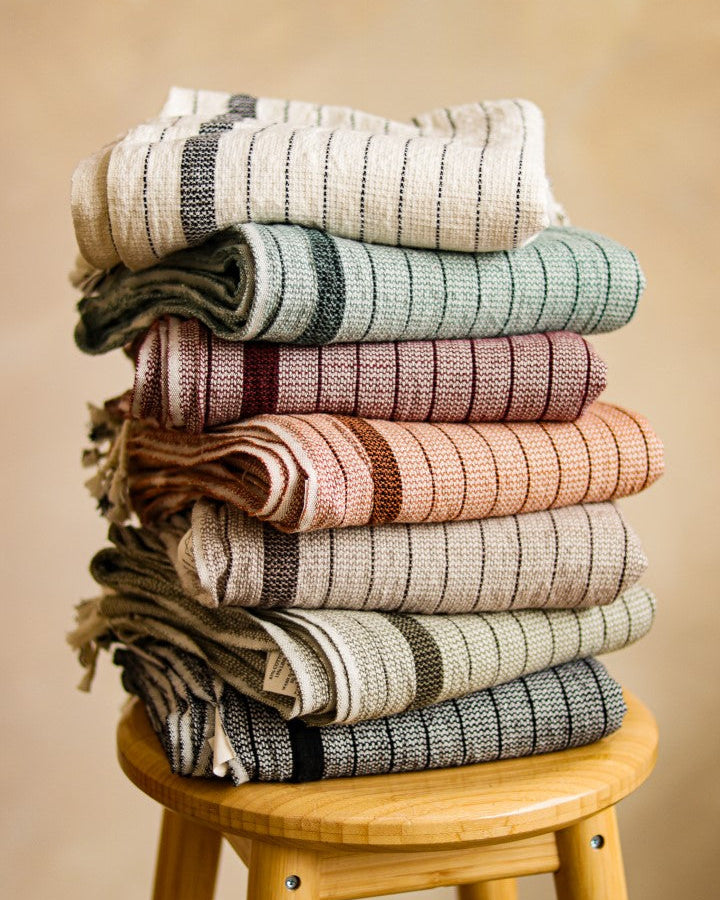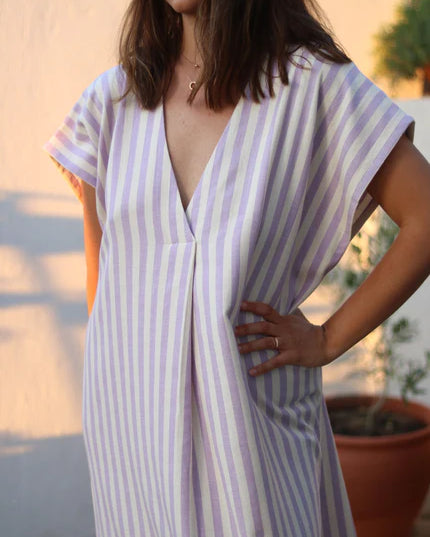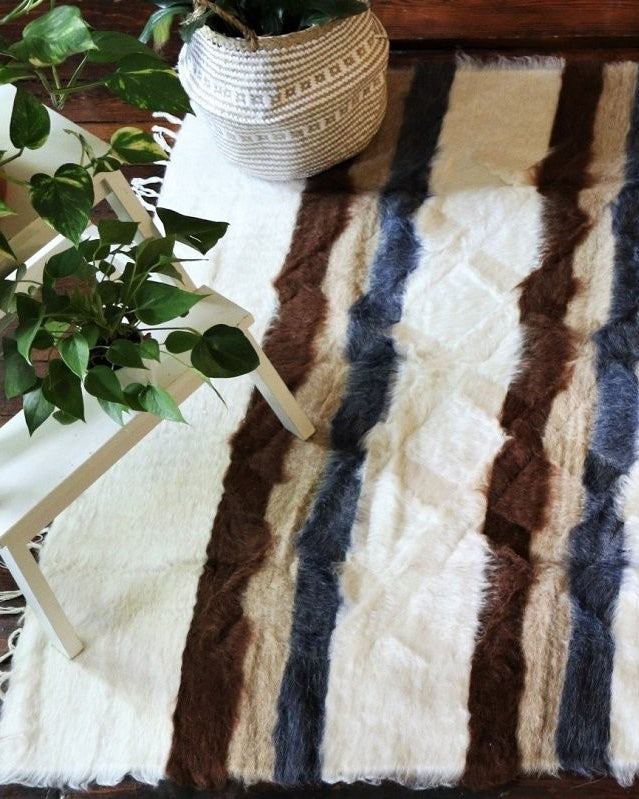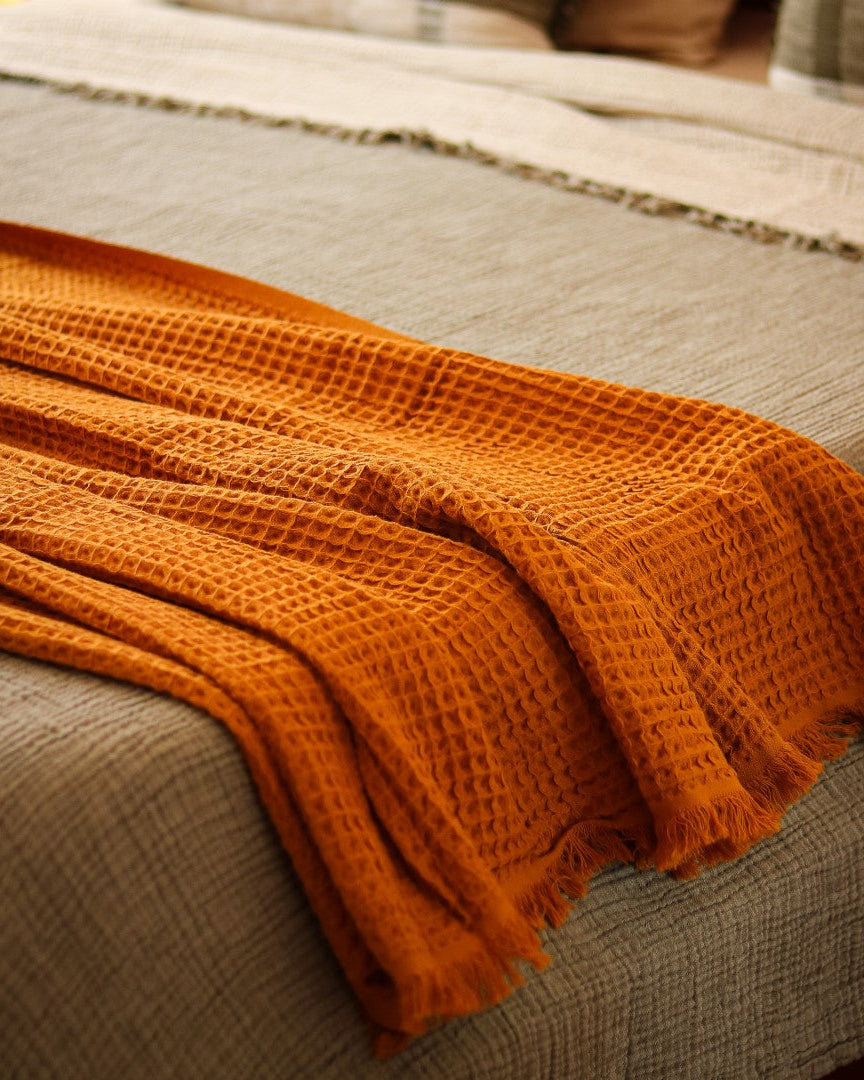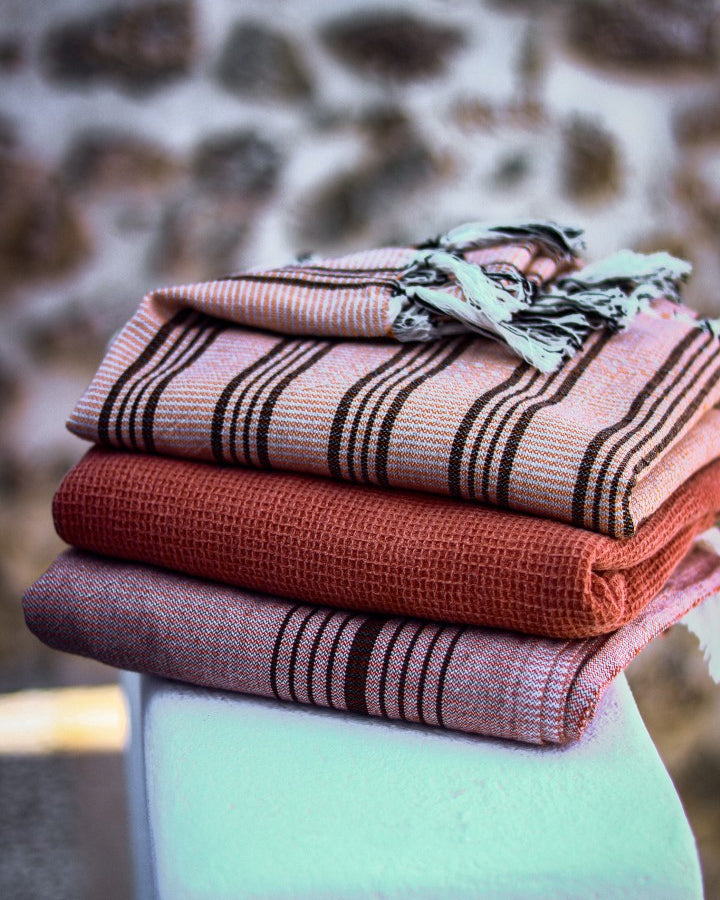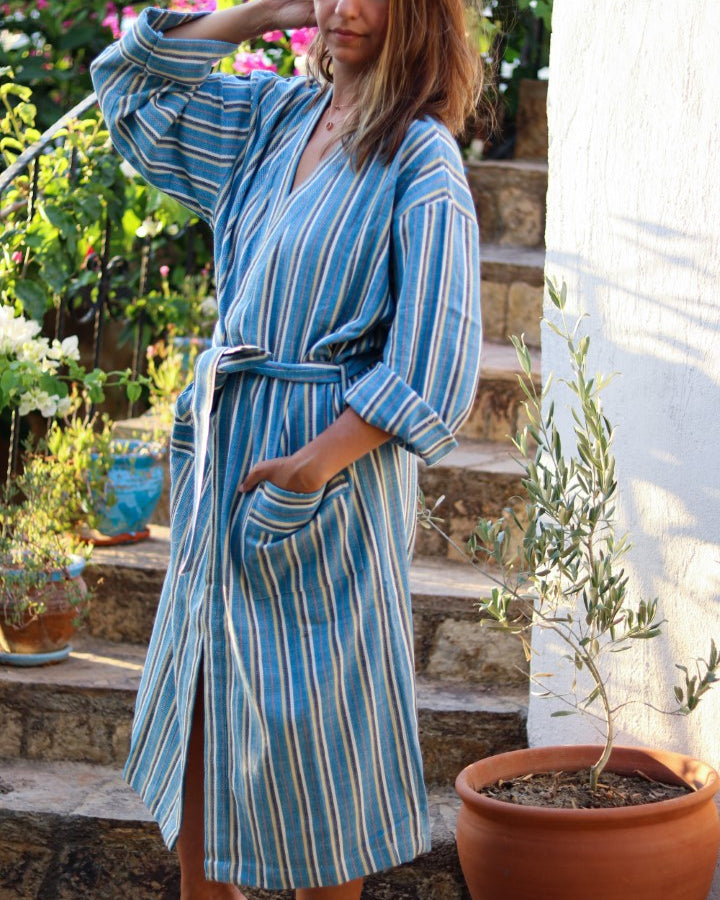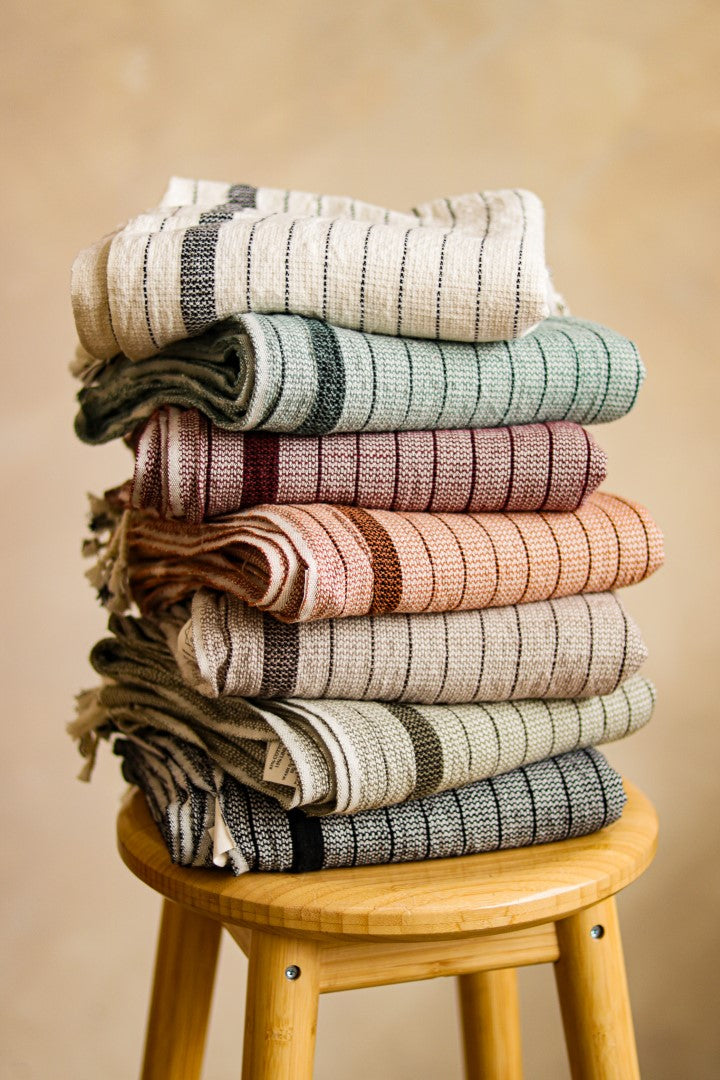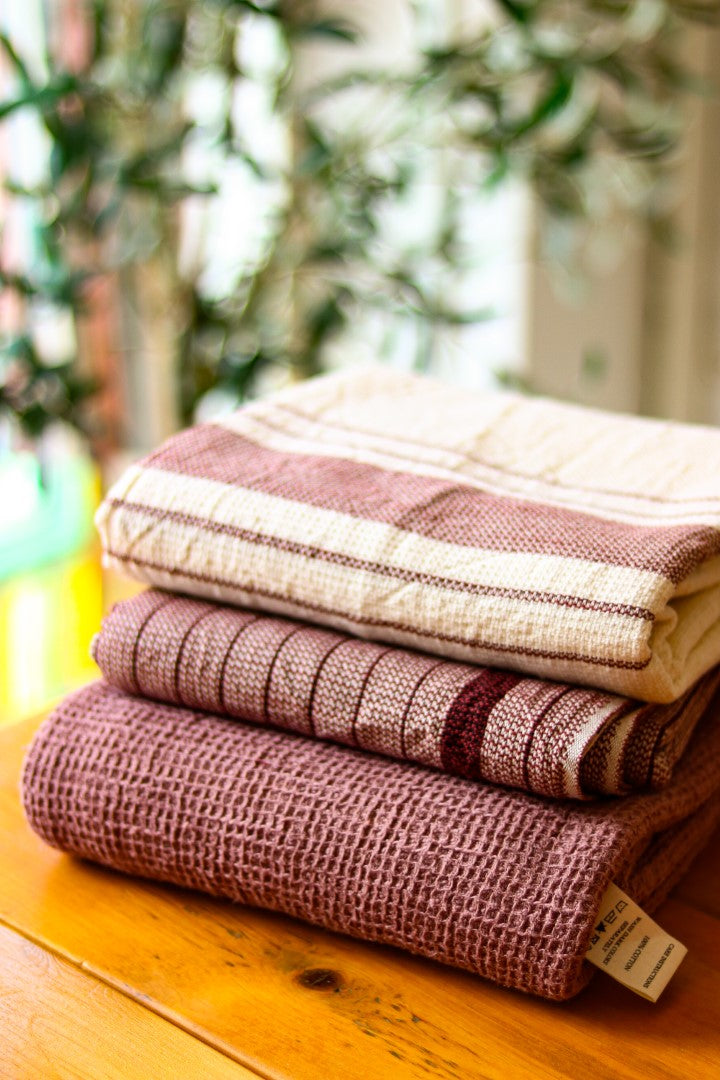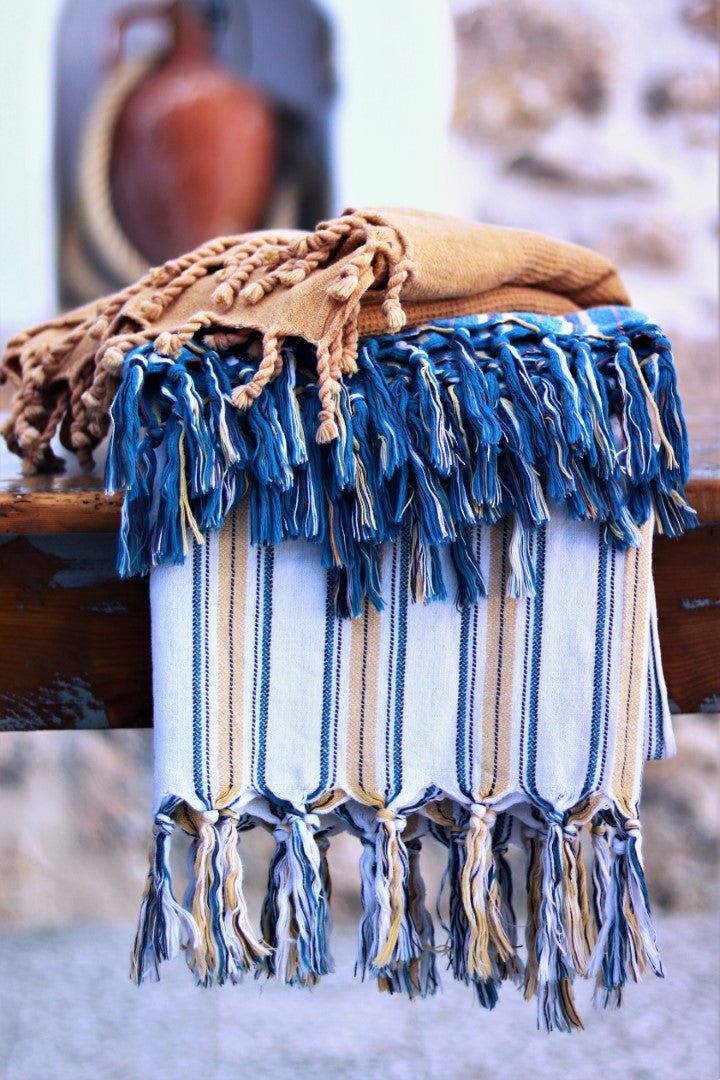Choosing organic cotton lounge wear isn't just about buying comfortable clothes. It’s a conscious decision that ties together a little everyday luxury with your own well-being. It’s about shifting toward pieces that are as good for the planet as they feel against your skin, making them a true staple in any modern wardrobe.
Why Organic Cotton Is Defining Modern Loungewear
Let's be honest, the lines between the office, home, and our personal time have all but disappeared. Because of this, what we need from our clothes has completely changed. We're no longer looking for separate outfits for every single occasion.
Instead, we're drawn to versatile, high-quality essentials that deliver serious comfort without ever sacrificing style or sustainability. This is exactly where organic cotton lounge wear comes in and makes its mark.
It's the perfect answer for clothing that feels just as good as it looks while aligning with a more thoughtful way of living. Don't just think of it as your lazy Sunday outfit; see it as the building block for a flexible, go-anywhere uniform. It’s that soft tee that looks just right under a blazer for a video call, or the joggers that are stylish enough for a quick coffee run. It’s the robe that feels like a sanctuary after a long day.
The Rise of Conscious Comfort
The growing movement toward organic fabrics is really rooted in a better understanding of their true impact. Conventional cotton farming often depends heavily on synthetic pesticides and fertilizers, which can degrade soil health and pollute water systems.
Organic farming, on the other hand, is all about working in harmony with nature. If you're curious to dive deeper into these differences, you can learn more about how eco-friendly cotton can be when it's grown the right way.
This shift toward sustainability brings real, tangible benefits directly to you and your wardrobe:
- Purity and Softness: Because organic cotton fibers aren't broken down by harsh chemical processing, they tend to be stronger and longer. The result is a fabric that's exceptionally soft and gentle, making it a dream for anyone with sensitive skin.
- Peace of Mind: When you choose organic, you're supporting farming methods that protect biodiversity, conserve precious water, and create healthier working conditions for farmers and their local communities.
- Lasting Quality: Garments crafted from high-quality organic cotton are simply more durable. They hold their shape and stay soft, wash after wash, which makes them a smart investment in both your comfort and your closet.
This infographic breaks down how consumer demand, environmental awareness, and our changing lifestyles have all contributed to the rise of organic cotton loungewear.
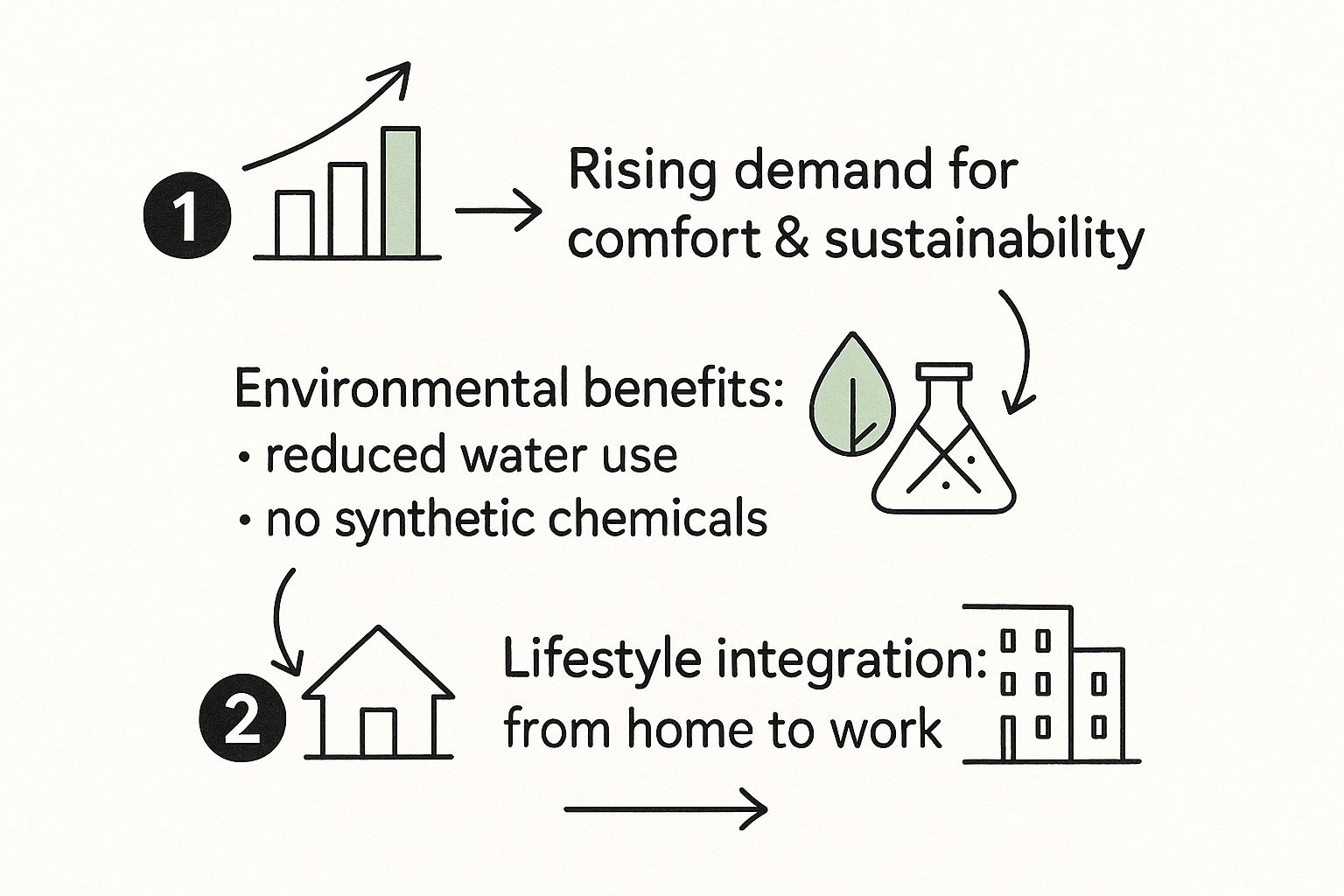
It’s clear to see that the appeal of organic cotton is a direct response to our modern need for clothing that is sustainable, versatile, and incredibly comfortable.
The Journey from Organic Seed to Your Sofa

The story behind your favorite piece of organic cotton lounge wear starts long before it ever lands in your closet. It begins with something very small: a seed. But this isn't just any seed. It's a non-genetically modified (non-GMO) cotton seed, planted in soil that has been carefully brought back to life, completely free from the synthetic chemicals that are so common in conventional farming.
Think about the difference between a small, lovingly tended backyard garden and a massive industrial farm. The gardener works with the soil, using compost and natural techniques to enrich it and create a balanced little ecosystem where plants flourish. That's the heart of organic cotton farming.
This holistic way of doing things creates a ripple effect of good. By ditching synthetic pesticides and fertilizers, farmers protect local water from chemical runoff and keep biodiversity alive—from helpful insects to the tiny microorganisms that make soil healthy. This method also helps the soil hold onto water more effectively, which is a big reason why organic farming can use significantly less water than conventional methods.
From Healthy Soil to Pure Fiber
When the cotton bolls are ready, they're often picked by hand. This gentle approach avoids the damage that heavy machinery can cause, keeping the long, strong, and pure cotton fibers intact. It’s these fibers that give organic cotton its signature softness and durability. There’s no need for harsh chemical defoliants, so the process stays clean from the get-go.
That commitment to purity doesn't stop when the cotton leaves the farm. The next steps—spinning the fiber into yarn, weaving it into fabric, and then dyeing and finishing it—are just as critical in defining what makes a garment truly organic.
Organic is a whole-system approach. It's not just about avoiding chemicals, but about building a regenerative system that respects the land, the farmers, and the final consumer. It's a promise of transparency and health from field to fabric.
This is where globally recognized certifications come in handy. They are your guarantee that the entire supply chain is held to incredibly high standards.
- No Harmful Chemicals: The dyes used on certified organic fabrics are free from heavy metals, formaldehyde, and other nasty toxins that can irritate skin and pollute the environment.
- Ethical Labor Practices: These standards also ensure the people making your clothes are treated with respect, with safe working conditions and fair wages.
- Environmental Responsibility: Factories are required to have proper wastewater treatment systems, preventing harmful chemicals from being dumped into local ecosystems.
The Growing Demand for Conscious Comfort
The meticulous process behind organic cotton is connecting with more and more people. As we all become more mindful of what we put on our bodies, the call for transparent, sustainable clothing is shaking up the fashion world. This shift is especially clear in the loungewear market, which has seen some incredible growth.
The global loungewear sector was valued at about USD 4.6 billion and is expected to climb to USD 8.5 billion by 2032. North America is leading the charge, holding a 35% global market share thanks to strong consumer spending and a real desire for comfortable, high-quality clothes. Within this booming market, organic cotton is grabbing the spotlight as shoppers start prioritizing their environmental footprint. You can read more about why natural fibers are trending in cozy clothes over on Cotton Incorporated's Lifestyle Monitor.
Ultimately, the journey of organic cotton is one of intention. Every single step, from that non-GMO seed to the final stitch, is thoughtfully planned to create something that's kinder to our planet and gentler on your skin. So when you slip into your favorite organic cotton robe or joggers, you're not just wearing clothes—you're wrapping yourself in a story of thoughtful craftsmanship.
Why Organic Cotton Feels So Incredibly Good

While the environmental story is what draws many people to organic cotton, the real magic happens the moment it touches your skin. There’s a noticeable difference in how it feels—a softness and airiness that conventional cotton just can't seem to replicate. This isn't just a subjective feeling; it’s a direct result of how the cotton is grown and handled from seed to shirt.
The secret starts with the cotton fibers. Organic cotton is often picked by hand, a much gentler process than the harsh, high-speed machine harvesting used for conventional cotton. This careful handling protects the delicate fibers, keeping them long, strong, and unbroken.
Think of it this way: hand-picked cotton fibers are like long, smooth strands of silk, while machine-harvested ones can become tangled and broken. Those longer, intact fibers are what give organic cotton lounge wear its signature silky feel and impressive durability. Garments made this way are far less likely to pill or wear thin, so they stay soft and hold their shape, even after many washes.
To make the differences crystal clear, let's break them down side-by-side.
Conventional Vs Organic Cotton A Quick Comparison
This table highlights the key distinctions between the two, from the farm all the way to the finished fabric.
| Attribute | Conventional Cotton | Organic Cotton |
|---|---|---|
| Farming | Uses GMO seeds; relies heavily on synthetic pesticides & fertilizers. | Uses non-GMO seeds; grown with natural methods like crop rotation. |
| Water Usage | Extremely high; often grown in water-stressed regions. | Uses up to 91% less "blue" water, relying on rainwater instead. |
| Harvesting | Primarily machine-harvested, which can damage cotton fibers. | Often hand-picked, preserving the length and strength of the fibers. |
| Processing | Treated with chlorine bleach, formaldehyde, and heavy metal dyes. | Processed with natural or water-based dyes and no harsh chemicals. |
| Fabric Feel | Can feel stiffer or less soft due to shorter, damaged fibers. | Exceptionally soft and strong due to longer, intact fibers. |
| Skin Impact | Chemical residues may irritate sensitive skin or cause allergies. | Naturally hypoallergenic and gentle on all skin types. |
| Durability | More prone to pilling and thinning over time. | More durable and becomes softer with each wash. |
As you can see, the path from field to fabric is fundamentally different, and that difference is something you can truly feel.
A Gentle Sanctuary For Your Skin
If you have sensitive skin, allergies, or conditions like eczema, the purity of organic cotton can be a revelation. The fabric is naturally hypoallergenic simply because it isn't grown or processed with the harsh chemicals that plague conventional cotton production.
Standard cotton farming often involves a laundry list of synthetic pesticides, chlorine bleach, formaldehyde, and heavy metal dyes. These residues can easily linger in the finished garment, becoming a hidden source of skin irritation and allergic reactions.
Choosing certified organic cotton means you're wrapping yourself in a material that is as pure as it is soft. It's a clean, non-toxic barrier that lets your skin breathe without exposure to harsh irritants.
This makes organic cotton a wonderful choice for everyone, but especially for babies and children, whose skin is thinner and more absorbent. It offers the simple peace of mind that comes from knowing what’s next to your family’s skin is clean and safe.
The Smart Way To Regulate Temperature
Beyond its softness, organic cotton is a true performance fabric, expertly keeping you comfortable no matter the season. Its natural fibers are incredibly breathable, allowing air to circulate and preventing that clammy, stuffy feeling you often get from synthetics like polyester.
This breathability is what makes it so good at thermoregulation:
- When it's warm: The fabric pulls moisture away from your skin and allows it to evaporate, creating a natural cooling effect. For more ideas on staying cool, check out our guide to the most breathable fabrics for hot weather.
- When it's cool: That same airy structure traps a thin layer of air next to your body, acting as a natural insulator to keep you warm and cozy.
The best part is that this incredible comfort is built right into the fiber itself. It’s not a chemical treatment or a temporary finish; it’s just the result of letting a natural material do what it does best. From the long, hand-picked fibers to the chemical-free finish, every step contributes to a fabric that feels less like clothing and more like a second skin.
How to Style Loungewear Beyond the Couch

Let’s be honest, the best part of organic cotton lounge wear is how good it feels. But its real magic? That same comfort can look incredibly chic outside your front door. These aren't just clothes for a quiet night in anymore; they're the building blocks of a truly modern wardrobe.
The trick is all about creating balance. Think of your loungewear as the soft, comfortable heart of your outfit. From there, you just need to layer in a few structured, more polished pieces to show you've put it all together with intention. It's this "high-low" mix that takes a simple pair of joggers from the sofa to the street.
Elevating the Organic Cotton Jogger
Your go-to organic cotton joggers have more potential than you think. With their clean lines and beautiful fabric, they're surprisingly easy to dress up.
The secret is to pair them with their sartorial opposite: structure. A sharp, well-fitting blazer is the perfect counterpoint to the jogger's relaxed vibe, creating a contrast that feels fresh and put-together. It’s an instant upgrade.
Give these combinations a try:
- For a Creative Workplace: Take a pair of grey or black joggers and team them with a crisp white t-shirt. Add a tailored navy blazer and some clean, minimalist leather sneakers. A structured tote bag pulls the whole professional-yet-relaxed look together.
- For a Weekend Outing: Start with your joggers and add a fitted knit sweater or a classic striped long-sleeve tee. Throw a denim jacket on top and finish with a pair of stylish loafers or ankle boots.
A quick tip: joggers with a slightly tapered fit are much easier to style. They create a cleaner, more streamlined silhouette that doesn't scream "I just rolled out of bed."
Think of it like cooking. Your organic cotton piece is the star ingredient. The accessories and structured layers are the spices and textures that elevate a simple dish into something special.
Styling the Versatile Tee and Hoodie
A classic organic cotton t-shirt and hoodie might be the most hardworking pieces in your closet. When you look beyond their casual reputation, you’ll find they can anchor an incredible number of outfits.
Layering is where the magic happens. A simple white or black tee tucked into high-waisted trousers or a silk midi skirt looks effortlessly polished. The contrast between the simple cotton and a richer fabric creates a really interesting texture.
And don't underestimate the hoodie. It can be styled in some surprisingly cool ways:
- Under a Trench Coat: A hoodie layered under a classic camel trench gives you that "off-duty model" vibe that's perfect for those in-between seasons.
- With Smart Trousers: Try pairing a neutral-colored hoodie with some wide-leg trousers and sleek sneakers. It's a look that’s both fashion-forward and ridiculously comfortable.
Tying It All Together with Accessories
Accessories are what tell the world your outfit was deliberate. The right finishing touches can instantly make your loungewear feel more polished and complete, taking it from an afterthought to a statement.
Focus on these three areas to really nail the look:
- Structured Handbags: Ditch the slouchy tote for a structured leather bag or a sharp crossbody. It adds an immediate dose of sophistication.
- Quality Footwear: The shoes make the outfit. Swap worn-out trainers for a clean, minimalist pair, some chic leather loafers, or a great pair of ankle boots.
- Delicate Jewelry: You don't need much. A simple gold chain, a pair of small hoop earrings, or a classic watch adds a subtle touch of refinement that ties everything together beautifully.
By mixing your comfortable organic cotton lounge wear with these key pieces, you open up a whole new world of style that proves comfort and chic can absolutely go hand-in-hand.
Choosing and Caring for Your Loungewear
When you invest in a beautiful piece of organic cotton lounge wear, you're buying more than just clothing—you're choosing lasting comfort. But to make sure you get a piece that truly stands the test of time, it helps to know what to look for beyond just the "organic" label.
Once you find that perfect set, a little bit of thoughtful care will go a long way. The right washing and drying habits will protect the fabric's natural softness, shape, and color, keeping your loungewear feeling brand new for years.
How to Spot True Quality
Think of yourself as a textile detective when you're shopping. The signs of exceptional quality are all there—you just need to know what to look for. Keep this simple checklist in mind, and you'll be able to pick a winner every time.
- Look for GOTS Certification: This is the big one. The Global Organic Textile Standard (GOTS) is the gold standard for a reason. It’s your guarantee that the cotton is genuinely organic and that the entire journey, from dyeing to finishing, was done without nasty chemicals and with respect for both people and the planet.
- Inspect the Seams: Give the seams a gentle tug. On a well-made garment, the stitching will be tight, even, and strong, with no gaps. This is a tell-tale sign of solid construction that won’t let you down.
- Feel the Weight of the Fabric: While not a hard and fast rule, a fabric with a little heft to it often means a denser weave and higher-quality cotton. It should feel substantial and smooth in your hands, not flimsy or thin.
- Check for Brand Transparency: Does the company talk openly about where its materials come from and how its clothes are made? Brands that are proud of their process are usually the ones you can trust.
The right piece of organic cotton loungewear should feel like a long-term companion, not a temporary comfort. Prioritizing quality construction and certified materials ensures it will be.
Simple Care for Lasting Softness
The good news is, caring for organic cotton is surprisingly easy. The main idea is to be gentle, protecting those natural fibers that make it feel so wonderful against your skin. Just follow these simple steps to keep your pieces in pristine condition.
- Wash in Cold Water: Always stick with a cold, gentle cycle. Hot water can make natural fibers shrink and cause colors to fade much faster.
- Use a Mild Detergent: Harsh chemicals and detergents can strip the cotton of its inherent softness. An eco-friendly, pH-neutral detergent is your best bet.
- Skip the Fabric Softener: It sounds counterintuitive, but commercial softeners coat fibers in a waxy film. This actually reduces the breathability and absorbency of your beautiful organic cotton.
- Air-Dry When You Can: The absolute best method is to hang your loungewear or lay it flat to dry. This preserves its shape perfectly. If you're in a pinch and must use a dryer, always use the lowest heat setting possible.
Proper care isn't just about maintenance; it’s about honoring the material and the craftsmanship behind your garments. These habits are very similar to what's recommended for other premium textiles, like learning how to care for the best organic cotton towels to keep them plush and absorbent.
As more of us look for sustainable and comfortable clothing, the market is growing fast. In fact, the global cotton loungewear market is expected to hit USD 6.19 billion by 2025, with online shopping making it easier than ever to find incredible brands. As shoppers become more conscious of their choices, companies that offer high-quality, responsibly sourced organic cotton are set to thrive. You can find more insights on this expanding market and its trends.
If you’re curious to learn more about textiles beyond organic cotton, resources like a guide to different blanket materials can offer a broader perspective on their unique properties. By choosing well and caring thoughtfully, you can make sure every moment spent in your loungewear is just as comfortable as the very first.
The Anatolico Difference in Sustainable Loungewear
At Anatolico, we believe quality, comfort, and sustainability aren't just separate goals—they’re woven together into everything we create. Our story isn't one of mass production. Instead, it’s a story of heritage, painstaking craftsmanship, and a profound respect for our star material: premium Turkish organic cotton.
We think true luxury in organic cotton lounge wear is born from combining time-honored weaving traditions with modern, ethical standards. This idea is the guiding force behind every single piece, ensuring that what you wear feels incredible and is made with integrity.
The Heritage of Turkish Cotton
The heart of our collection is a truly special material: Turkish cotton. This cotton, grown in the Aegean region, is famous for its extra-long fibers. Imagine them as long, silky, unbroken threads. This unique quality is what gives our fabrics their incredible softness, durability, and absorbency.
Unlike other cottons that feel heavy when damp, Turkish cotton is naturally light and dries remarkably fast. This makes it the perfect choice for robes and towels that need to feel both cozy and breathable. It’s a material that actually improves over time, getting softer and more comfortable with every wash until it becomes a treasured part of your daily life.
At Anatolico, we see each garment as a continuation of a story—one that begins in the fertile soil of Turkey and is woven into existence by the skilled hands of master artisans.
Our commitment doesn’t stop at sourcing the best materials. We partner directly with small, family-like workshops in our founder Derya's hometown. Here, artisans use weaving techniques that have been passed down for centuries. This hands-on, traditional approach means every detail is perfect, from the texture of a waffle weave to the elegant drape of a kaftan.
A Commitment to Conscious Craftsmanship
We take this rich heritage and pair it with a strong dedication to modern sustainability. Every Anatolico product is OEKO-TEX certified, which guarantees that no harmful chemicals or substances are used at any point in the production process. This certification ensures our loungewear is not only safe for your skin but also gentle on our planet.
This meticulous process is part of a much larger shift toward responsible production. To get a better sense of how these ideas apply across different industries, you can explore the broader principles of sustainability and see how these values are making an impact globally.
When you choose Anatolico, you aren't just buying another piece of clothing. You’re investing in a story of quality, supporting traditional craftsmanship, and embracing a more thoughtful, conscious way of living. It's the peace of mind that comes from knowing exactly where your comfort comes from.
Your Questions About Organic Loungewear, Answered
Thinking about making the switch to organic cotton? It’s a great move, but it's natural to have a few questions before you dive in. We hear these a lot, so we've put together some straightforward answers to help you feel great about your choice.
Is Organic Cotton Loungewear Really Worth the Higher Price?
In a word, yes. It helps to think of it less as an extra cost and more as an investment—in quality, in the planet, and in your own comfort. That higher price tag is a reflection of what goes into making a truly exceptional garment.
It means the cotton was farmed without toxic pesticides, the workers earned a fair wage, and the cotton fibers themselves are longer and stronger. This translates directly to loungewear that feels incredibly soft, won't pill after a few washes, and is built to last far longer than the cheap stuff. When you look at the cost-per-wear over time, it’s not just a conscious choice, it’s a smart one.
How Do I Know If Loungewear Is Actually Organic?
This is a great question because there's a lot of confusing marketing out there. Terms like "eco-friendly" or "natural" sound nice, but they don't mean much without proof.
The simplest way to cut through the noise is to look for an independent certification. Your best friend here is the Global Organic Textile Standard (GOTS). Seeing that GOTS logo on a label is your guarantee of authenticity.
A GOTS certification isn't just about organic farming. It's a top-to-bottom verification that the entire process—from spinning and dyeing to the final stitch—met the highest environmental and social standards on the planet.
It's a quick, reliable way to know your garment is free from harmful chemicals, was made with responsible water practices, and that everyone involved was treated fairly. It’s the gold standard for a reason.
Will Organic Cotton Shrink More Than Regular Cotton?
Not if you treat it right. The truth is, any natural fiber can shrink if you blast it with high heat. The real difference is that many quality brands pre-wash or pre-shrink their organic fabrics to give you a head start, minimizing any major changes in fit.
Ultimately, it all comes down to care. With a few simple tweaks to your laundry routine, you can keep your organic cotton pieces looking and feeling perfect for years. They'll hold their shape just as well—if not better—than conventional cotton.
Here’s the secret to keeping your loungewear fitting just right:
- Always wash in cold water. This is non-negotiable. Heat is the number one cause of shrinking.
- Use a gentle cycle. Less stress on the fabric means it keeps its structure.
- Air-dry when you can. Laying your pieces flat or hanging them is the kindest method.
- If you must use a dryer, go low. Tumble dry on the absolute lowest heat setting.
Follow these simple rules, and your organic cotton lounge wear will stay as comfortable and well-fitting as the day you got it.
Ready to feel the difference for yourself? The Anatolico collection brings together timeless Mediterranean craftsmanship and modern, sustainable luxury. Explore our organic cotton robes, kaftans, and loungewear, all made with care by true artisans. Shop our collection today and wrap yourself in quality you can truly feel good about.

